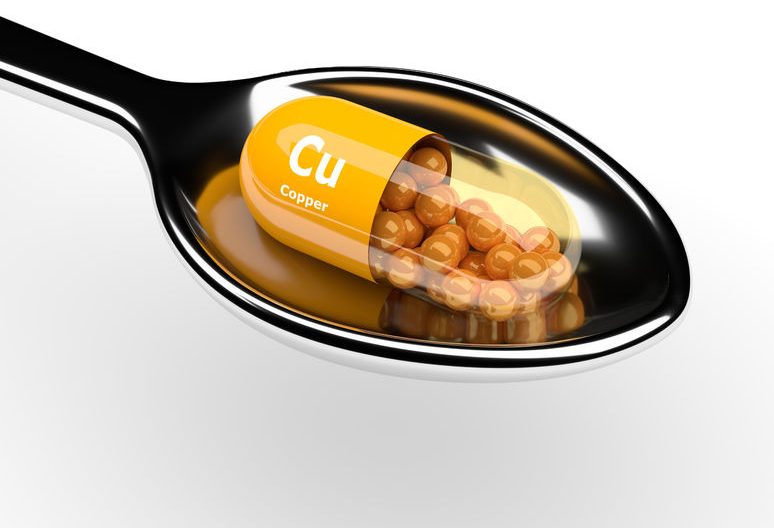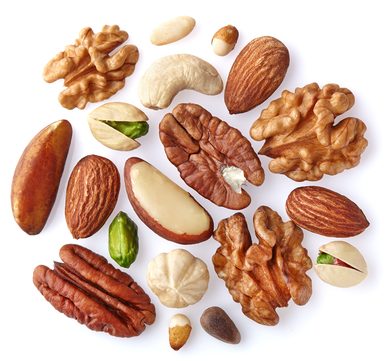
Table of Contents
Last Updated on
How does Copper work?
We all love copper, don’t we? Copper looks great in the kitchen with a variety of cups and pots, but it is also great for the body as well. Copper is a very important element that provides people with a healthy lifestyle. Primarily, this mineral helps with the process of the metabolism, by allowing vitamins and amino acids to work properly to keep the body up-to-date. In the human make-up, copper can’t be produced in the body, but can be added by the food you eat and/or from the supplements you take. In terms of minerals, copper is in the top three most important minerals for the human body and specifically for the thyroid. One of the reasons it is so important is due to the fact that copper is carried throughout the body in the form of a blood protein called Ceruloplasmin. Having a healthy dose of copper in the body through dieting is essential for the body.
Background of Copper
Traditionally, Egyptians used the “Ankh” symbol to coin copper in its writing. This symbol embodied “eternal life,” with many Egyptians believing that if used appropriately copper could prolong your existence. Copper actually has many wonderful properties. As an anti-bacterial substance, copper actually stops the spread of airborne and water bacteria. Lastly, copper helps the human body absorb other substances like Vitamin C and iron.
 The Benefits of Copper
The Benefits of Copper
Copper is a wonderful mineral because of its amazing health properties. Copper can provide growth to the body, help iron and its effectiveness within humans, and continue to develop hair fibers, tissue, and eye sight. Furthermore, copper can prevent aging, help increase energy throughout a person’s day, limit the pain from arthritis, and promote red blood cells. Lastly, copper has direct benefits when it comes to the thyroid in the way it helps to balance the gland’s inconsistencies.
Copper Deficiency Issues
Without copper, there can be a lot of issues in the body, besides the effects on the thyroid gland. Some of these deficiencies include anemia, birth defects, breakable bones, increased opportunities for infections, a lower temperature in the body, and many other issues. Other symptoms could include stunted growth, hair loss, and external bleeding. In young children who are boys, having a deficiency from copper can lead to a rare syndrome called Menkes, where copper can’t be absorbed at all. In some cases, medical treatments can allow for cooper absorption, even is the Menkes syndrome is found in the body.
Foods with Copper

Some nuts are rich in copper
There are a lot of foods that have copper in them. Some foods might not be as enjoyable as others, when it comes to items like liver, but copper is also in grains, almonds, meat, seafood, nuts, avocados, and beets to name a few. More specifically, consider consuming oysters, sesame seeds, cocoa powder, lobster, and sunflower seeds. Even juicy tomatoes can add copper to your diet. Also, people receive copper every time they use copper products to drink out of, or get their water from copper piping. Some copper is gained from food items that are in copper storage, but usually these tins lose their copper intake that could help the body.
Copper’s Helpfulness with the Thyroid Gland
Copper is essential when helping the thyroid gland function properly. In turn, if too much cooper is in the body, then this can lead to a malfunctioning thyroid, due to irregular hormone activity. These issues can lead to hyperthyroidism and hypothyroidism. So, finding a good balance of cooper is important for you and your thyroid gland.
If zinc is being taken, make sure you add a supplement of copper as well. Having a balanced amount of copper in your bloodstream can help develop estrogen and progesterone to help equalize the thyroid gland again. Most thyroid supplements already include zinc to take care of this issue.
Copper does wonders on the thyroid gland. Copper actually energizes the thyroid, and vice versa, it defends the body against too much excretion of the thyroid gland into the bloodstream. Along with its benefits directly with the thyroid gland, copper also balances calcium levels to help to absorb other minerals, including copper.
Finding the Right Copper Balance
A research study conducted by the American Journal of Clinical Nutrition (Volume 40, 1984) proved that copper can complicate thyroid issues if not careful. For example, people with hypothyroidism had low copper levels, and hyperthyroidism was prevalent in people with higher levels of copper in their body. Also, there are specific ratios for men and women when matching their copper intake with their zinc intake. Men should have a ratio of 5:1 for zinc to copper, while women need a 10:1 ratio of zinc to copper. A lot of studies even say to start with zinc before adding copper to see if it helps the thyroid gland issues. The important thing to remember with copper is it actually balances out the zinc in the body and is so important when dealing with thyroid difficulties.
Critical Issues involving Copper Overdose
It is imperative that people understand the importance of not misusing copper. Positively, copper can shrink tumors within the body, but if overused, the tumors can continue to grow even bigger than before. This is why copper supplements should not be taken spastically. There needs to be a specific intake of copper daily to prove the minerals’ use. Copper doesn’t work in the body right away. It takes some time to metabolize, so the concern is too much copper can be stored in the body without a person even knowing about it. When thinking about safety, adults should take between 1.5 – 3 mg of copper per day. In a child, they should not take more than 2.5 mg each day. If too much copper is taken in a supplement, some of these symptoms could occur in the body: stomach disorders, lower fertility levels, and/or dysfunction of sexual organs. In some life-threatening cases, damage can occur to the liver, kidney, and even the brain. If you are interested in taking copper to help with a thyroid gland issue, consult your doctor before starting your supplement. In the long run, copper has difficult symptoms to overcome if toxicity occurs, and can result in long-lasting damage. All of the thyroid supplements we have reviewed so far on our website have safe levels of copper.
Copper is not always the solution when fixing an under-active thyroid if symptoms like losing weight, fatigue, constipation, and irritability are already occurring. It is often needed to be paired with other minerals and vitamins.
Toxicity Awareness
If you are being cautious of the amount of copper you take, then consider these ways which copper may go into the body unnoticed. Copper can also enter the body by drinking tap water from the piping, from IUDs, and adrenal issues. If you detect that something is wrong with your body and copper may be the culprit, a blood test may be your first useful method. Also, a hair mineral analysis is very accurate as well. The great things about a hair mineral analysis is the testing actually detects other minerals in the body as well. The test usually only cost a small amount of money, but it is worth it to determine the ratio of minerals within your body that could be affecting you negatively. But, beware of the lab you choose to do your analysis. Some labs are better than others.
Correcting Copper Intake
If you need to correct your copper intake, then first try to limit the copper that goes in your body. Also, you may consider taking another mineral to counteract the copper within the body. Hopefully, finding the correct amount of copper to take may actually help the thyroid gland get back to normal. When used appropriately, copper is an amazing mineral for the human body. Give it a chance today, and see what copper can do for you down the road, as you continue to help your thyroid gland.
